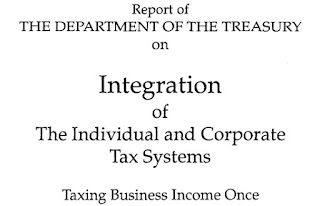A recent post (8/26/16) on the Tax Justice website was titled - Why we must close the pass-through loophole? That caught my attention as I was trying to think what the "loophole" might be? A loophole is a provision that can be used beyond its intended purpose because the rule is not written specifically enough. When a rule is being used as intended, it is not a loophole. For example, sometimes the mortgage interest deduction is called a loophole, but it is not. People deducting interest on the mortgages on their primary and vacation homes is using the rule as intended.
The "loophole" that was the subject of the blog post is large businesses operating as partnerships rather than as corporations. Partnerships, S corporations and sole proprietors do not pay corporate income tax. Instead, the income is taxed directly to the owners and only one level of income tax is paid at the federal level (and state level). In contrast, C corporations pay the corporate income tax AND when they distribute earnings (dividends) to shareholders, the shareholders pay income tax. Thus, C corporation income is taxed twice.
That just happens to be the way it works in the US tax system. It doesn't have to work that way and not all countries double tax corporate income. In the US, there is some relief in that qualified dividends received by individuals are subject to the lower capital gains tax rate.
Over the years, there have been numerous studies by the government and various organizations on how to integrate the corporate tax meaning have corporate income taxed only once. There are numerous ways this can be done. Two easy ones would be to not have a corporate tax (only tax dividends) or not tax dividends (only tax corporate income at that level when earned). Neither is ideal because not all corporations pay dividends and not all corporate shareholders are taxable (a lot of corporate stock is owned by tax-exempt organizations).
The Tax Reform Act of 1986 called for Treasury to study corporate taxation. This resulted in two reports issued in 1992 on corporate integration (January 1992 and December 1992). Most recently, Senator Hatch, chair of the Senate Finance Committee reports he is working on a plan for corporate integration and the SFC held two hearings on an approach called the dividends paid deduction model (5/17 and 5/24; also see Joint Committee on Taxation report prepared for the hearings).
Some of the advantages of corporate integration include:
- Treats all business entities similarly (although this also depends on the corporate versus individual tax rates applicable to business income).
- Removes or lessens a corporation's tax preference for debt over equity.
So, I ask the question differently from the Tax Justice blog post - why not eliminate double taxation of corporate income and find a way to tax all business entities similarly. And there are many ways of doing that. More later on that.
What do you think?












No comments:
Post a Comment